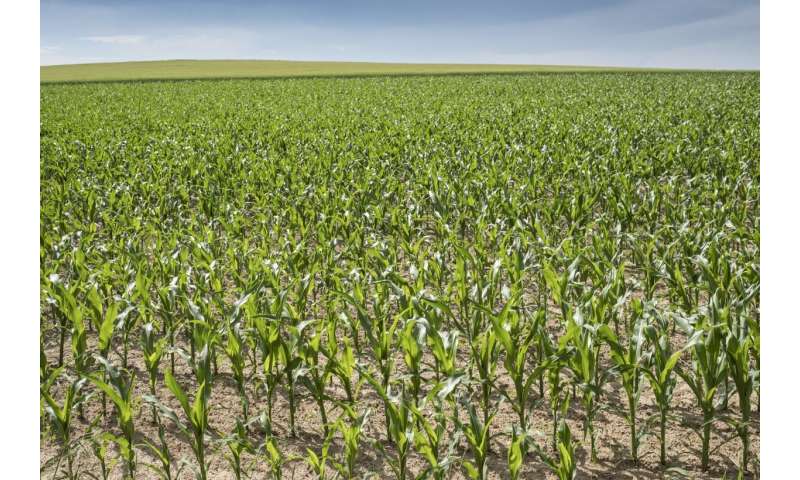
[ad_1]

Due to high imports of agricultural products, the EU is outsourcing environmental damage, KIT researchers say. Credit: Markus Breig, KIT
Europe will become the first climate-neutral continent by 2050: this Green Deal goal was announced by the EU at the end of 2019. Carbon emissions will be reduced, while forestry, agriculture, green transport, recycling and renewable energy will be pushed. In Nature, scientists from the Karlsruhe Institute of Technology (KIT) now show that this “Green Deal” could be bad business for the planet, as the EU will externalize environmental damage through high imports of agricultural products. Researchers recommend actions for the deal to promote global sustainability.
The Green Deal adopted by the European Commission intends to significantly change European agriculture in the coming years and help make Europe the first climate-neutral continent. By 2030, around a quarter of all agricultural land will be organically grown. The use of fertilizers and pesticides must be reduced by 20 and 50 percent respectively. In addition, the EU plans to plant 3 billion trees, restore 25,000 km of rivers and reverse the decline in pollinator populations, such as bees or wasps. “These measures are important and reasonable,” says Richard Fuchs of the Institute for Meteorology and Climate Research – Atmospheric Environmental Research (IMK-IFU), KIT Alpine Campus in Garmisch-Partenkirchen. “But it will also be necessary to specify foreign trade objectives. Otherwise, we will outsource the problem and continue to damage our planet.” The research team compared sustainability conditions abroad with those in Europe and recommended actions for a standardized procedure.
Sustainability standards must be defined and harmonized
According to the study, the European Union imports millions of tons of agricultural products every year. In 2019, a fifth of the crops were imported from abroad, as were many meats and dairy products. However, imports come from countries whose environmental laws are much less stringent than those in Europe. For example, genetically modified organisms have been severely restricted in EU agriculture since 1999. However, Europe imports genetically modified soybeans and maize from Brazil, Argentina, the United States and Canada, the study reveals.
“On average, Europe’s trading partners use more than twice as much fertilizer as we do. Pesticide use has also increased in most of these countries,” says Fuchs. According to him, the problem is that each nation defines sustainability differently. Things prohibited in Europe may be allowed elsewhere. “By importing goods from these countries, the EU is merely outsourcing environmental damage to other regions and is earning its laurels for its green policy at home,” the climate researcher stresses.
KIT scientists urgently recommend harmonizing sustainability standards, severely reducing the use of fertilizers and pesticides, and avoiding deforestation. “The EU cannot impose its standards in other countries, but it can require that goods entering the European market meet EU requirements,” says Richard Fuchs.
Evaluation of the CO2 world footprint and reduction in meat consumption
The researcher points out that the CO2 the footprint needs to be assessed worldwide and subsequently improved. Carbon balancing under the Paris Agreement only covers emissions caused by domestic production, but not emissions from producing these goods abroad.
Furthermore, scientists promote the reduction of meat and dairy consumption. This would reduce the import of agricultural products. Domestic production according to adequate standards should be strengthened. To this end, areas with low species diversity or not previously used for agriculture could be converted. This would reduce deforestation in the tropics, which is mainly caused by the creation of new framing areas. Yields could be increased by CRISPR gene editing technology, the team says. This technology improves edible mass, height and pest resistance of plants without using genes from another species.
“Not all measures are easy to implement. Reorienting agricultural production, however, would help protect European food crops from global market fluctuations, supply chain disturbances and some impacts of climate change,” says Fuchs. “Only then will the” Green Deal “be good business not only for a climate-neutral Europe, but also for our entire planet.”
Climate protection study: more forests, less meat
Richard Fuchs et al. The European Green Deal offends environmental damage to other nations, Nature (2020). DOI: 10.1038 / d41586-020-02991-1
Provided by Karlsruhe Institute of Technology
Quote: Green Deal: good for a climate neutral Europe, harmful to the planet (2020, 12 November) retrieved 13 November 2020 from https://phys.org/news/2020-11-green-good-climate-neutral- europe -bad.html
This document is subject to copyright. Apart from any conduct that is correct for private study or research purposes, no part may be reproduced without written permission. The content is provided for informational purposes only.
[ad_2]
Source link